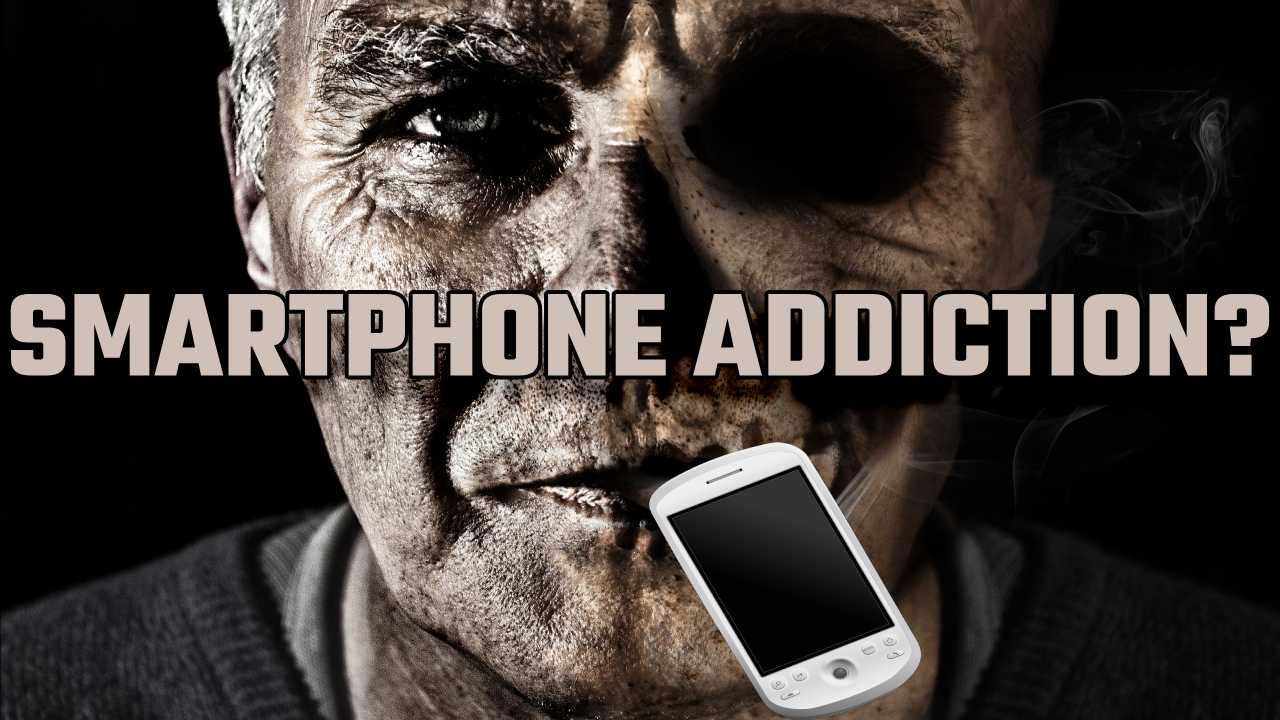Podcast: Download
Subscribe: Apple Podcasts | RSS

Not literally, but what about that twitchy connection to your phone?
It definitely affects your abilities to concentrate and think deeply.
And that means device addiction harms your ability to remember.
Worse:
Smartphone addiction not only turns you into a social pariah…
It Can Also Be Fatal!
In 2015, distracted driving (due to texting or talking on the cellphone) killed 3,477 people and injured another 391,000.
And there’s more bad news…
According to the National Safety Council, using cell phones while driving can make you more accident prone than even drunk driving…
No wonder people are concerned over how cell phones are affecting their lives!
In January this year, two of Apple’s biggest shareholders wrote an open letter to the company requesting it to provide “more choices and tools” so that parents could restrict their children’s smartphone usage time.
The letter added that researchers have found this shocking statistic:
“U.S. teenagers who spend 3 hours a day or more on electronic devices are 35 percent more likely, and those who spend 5 hours or more are 71 percent more likely, to have a risk factor for suicide than those who spend less than 1 hour.”
Smartphone addiction is a serious issue and may need some creative problem solving using the C.R.E.A.T.E. formula:
But here’s the real question:
What about YOU?
Are you displaying cell phone addiction symptoms?
Let’s find out:
Are You A Nomophobic?
I know you will never admit it, but when you are unable to find your phone for even 30 seconds, it causes a minor anxiety attack.
How do I know this?
Because it happens to people every single second of the day.
And there’s a name for is disease:
Nomophobia or ‘NO MObile PHOne phoBIA’ is the fear of not being able to use your cell phone or have access to your device.
Want to know if you’re truly addicted? Take this online quiz to find out.
Nomophobia is real, but the medical community is not ready to declare overuse of cell phones as a clinical addiction.
Ignoring The Data?
They neglect to do so in the face of some shocking data.
As the Joker suggests (I misquote), “whatever doesn’t kill us, only makes us stranger”…
Nearly one in ten people admitted to using their smartphones during sex, in the shower, on a movie date, in church or other place of worship, as per the 2013 Mobile Consumer Habits.
What’s more, nearly three-quarters of the respondents said that they were always within five feet of their smartphones.
Although doctors do agree that if you can’t stop using your phone, even when it’s harming your life, you may be “addicted.”
“Only a small percentage of people qualify as addicted. But many people overuse their smartphones.”
This quote comes from Dr. David Greenfield, assistant clinical professor of psychiatry at the University of Connecticut and founder of the Center for Internet and Technology Addiction.
Smartphone addiction is not listed as an official mental disorder listed in the Diagnostic and Statistical Manual of Mental Disorders. However, psychologists are debating about whether that should change.
Some researchers also say that the development of smartphone addiction is similar to that of a gambling disorder (or gambling addiction), which is included in the Diagnostic and Statistical Manual of Mental Disorders.
How does addiction work?
With gambling, the reward of winning once in a while is what hooks people to the habit.
Smartphone addiction works on a similar principle. Most of the time, a phone notification will be insignificant.
However, every once in a while…
Something Meaningful Happens!
Like a phone call from an old friend, or a Facebook notification that someone has tagged you in a photo. Researchers say this type of messages are irresistible and can lead to overuse or addiction to your device.
There’s more…
Device addiction can extend far beyond just the smartphone.
Recently, the World Health Organization announced that video game addiction will now be classified as an official mental health condition in the 11th revision of the International Classification of Diseases.
According to the WHO, gaming disorder is “characterized by a pattern of persistent or recurrent gaming behavior manifested by:
1) impaired control over gaming (e.g., onset, frequency, intensity, duration, termination, context);
2) increasing priority given to gaming to the extent that gaming takes precedence over other life interests and daily activities;
3) continuation or escalation of gaming despite the occurrence of negative consequences.”
“The behavior pattern is of sufficient severity to result in significant impairment in personal, family, social, educational, occupational or other important areas of functioning,” WHO adds.
Whether it is to play video games or check your Facebook notifications, here’s the truth:
Spending too much time with your smartphone will slowly but surely harm your mind.
How Smartphone Addiction Damages Your Memory
For starters, the presence of smartphone alerts is disrupting our already weak ability to focus on the task at hand.
Moreover, excessive use of cell phones also causes headaches, impaired concentration and memory, and fatigue.
If you are constantly using your mobile phone to surf the internet it affects the brain’s frontal lobe and brainstem functions, resulting in decreased ability to speak, reason and comprehend social cues.
Researchers also found that smartphone addiction can lead to an imbalance in brain chemistry that triggers depression and anxiety.
Ultimately, smartphone addiction can impair your ability to interact in the real world to the detriment of your personal and professional relationships.
It’s Not Just Brain Damage
Smartphone addiction does more than alter your brain chemicals. Your posture also gets affected when you use your phone all the time.
And according to the National Center for Biotechnology Information, posture affects mood, behavior and memory.
Therefore, frequent slouching to look at your device screen can make you depressed.
What’s more, Researchers at the University of Michigan state that the tucking your chin (or chins) and hanging your head to look at the smartphone is also causing empathy levels to fall and narcissism to rise among individuals.
The only thing worse than narcissism is abusing these memory improvement vitamins.
A Reliable, Easy & Fun Way To Learn Things
(Without Googling It On Your Smartphone)
We have all done it:
Reached for our smartphones the instant we want to verify a fact, learn a new bit of information, watch a video or read an ebook.
But there are other approaches.
One simple way to undo the damage done by mobile phone overuse is to switch off the phone and go back to a real book for information or entertainment.
Need more incentive?
Re-read of a book from the past. This way you’ll not only defeat Digital Amnesia, you’ll also enhance your attention as you give your brain the opportunity to revisit information from the past offline. Re-reading (and reading in general) also promote delayed gratification. You have to get through a lot of pages in order to see the entire story. The reason this works to preserve your brain has to do with what scientists sometimes call desirable difficulty.
You can also Mind Map, and I’ve recently shared one of my own to demonstrate just how powerful this approach can be for memory, focus and concentration:
Digital Fasting…
The Cure For Smartphone Slavery?
But the ultimate technique is called “Digital Fasting.”
It’s easy:
Just leave your smartphone at home or sit in a cafe with no WiFi so that you are not distracted by your device and can dedicate mental space to the book at hand.
And if boredom strikes and you feel the need to sneak out your smartphone, use these 3 ridiculously boring ways to add focus and excitement to your life.
But no memory improvement training will work to the highest possible degree if its not linked to memorizing information that will immediately improve your life.
And to do that, you learning projects need to involve Memory Palaces (ideally by creating them the Magnetic Memory Method way, including these sensory memory exercises).
Why On Earth Is That?
Because when you create Memory Palaces using the Magnetic Memory Method it lets you measure your memory improvement activities.
And tracking your outcomes leads to rapid improvement in the way information gets stored in your long term memory.
Even better:
All other memory techniques including playing crossword puzzles can be used inside of Memory Palaces.
But this never takes place the other way around (For example, you can’t use Memory Palaces inside of the Major Method the way you can use the Major Method inside of Memory Palaces.)
Building Memory Palaces is also great for dealing with a diminishing attention span.
Use the tips in this video about how to break through your attention span myths and limitation to help you craft the attention span you deserve.
If you are looking for a complete brain rehab try this method…
Click on the link below to get started:
Get More Out Of Your Existence
You want to live a full, vibrant, exciting life?
You don’t want a zombie-like existence where a handheld device controls your emotions, moods, experiences and even what information your brain can or should store? Focused attention is what you want instead.
If “hell yeah” is your response then we are on the right track!
But don’t worry if you don’t have it all mapped out when trying to get rid of the smartphone addiction habit. You don’t have to.
You can create your own hacks for building better habits. You can explore multiple mnemonic strategies. And you can learn to master many mnemonic devices that will make using your mind and memory an absolute delight.
Better still, use the magic of Memory Palaces to unlock your brain’s true potential and lead the magnetic life you deserve.
Come on, say it loud (just not into your smartphone) – hell yeah! 🙂
Related Posts
- MMMPodcast Episode 001: 5 Ways To Ruin A Perfectly Good Memory Palace
In this session of the Magnetic Memory Method Podcast, I talk about the 5 ways…
- 15 Brain Exercises & Memory Exercises For Rapid Remembering
Would you like simple brain exercises that you can complete just about anywhere? These brain…
- MMMPodcast Episode 001: 5 Ways To Ruin A Perfectly Good Memory Palace
In this session of the Magnetic Memory Method Podcast, I talk about the 5 ways…






8 Responses
Great article, Anthony!
Society is sick all over the world, and I don’t think it will get better any soon, considering our educational system and people’s inherently desire for instant gratification.
I limited my time on social media to a minimum a day.
By checking how much time I was wasting on nonsense with the Quality Time app (android) – Checky for ios, something had to be done so I:
– Removed the social medias apps from the smartphone.
– Broke the habit of passing mindlessly through the social media feeds. Don’t like or share almost anything anymore. Sometimes I still spend 1-2 minutes, but then I feel sucked by the screen, stop it and deinstall the app (yes, I install and reinstall it once a day).
– Blocked access to some websites in my browser, such as facebook and online newspapers. (plugin: block site)
Best regards and keep spreading good ideas!
Aleno
Thanks for this, Aleno. Much appreciated!
It’s great that you limit your time and thank you for sharing the names of these apps.
I think it’s admirable that you install and uninstall this every day. That is a discipline well worth developing for all of us.
For myself, I use Kill News Feed on Facebook and that has been incredibly useful. I’d rather not do Facebook at all, but there are some benefits for the Secret groups I run and it’s important for people like me to meet people where they’re at. This app has helped make it doable for me and I’m glad for it.
But there’s no way Facebook is ever getting on my phone and I don’t know that I’ll ever do Facebook live, most likely not for the topic of memory. But never say never is the best policy as usual, and who knows. Maybe the human brain will evolve faster than we think and these issues will disappear.
What do you think? Will brain elasticity develop favorably to combat combine fast enough?
Hi Anthony, thanks for your answer.
Concerning Facebook, try Facebook Tool Kit. It’s a plugin that allows you unfollow and unfriend many people at a time, unlinke pages, get out of groups and so on with bulk action.
I cleaned up my feed doing that. Please be careful not to unfriend everyone like I did once (huuuuge and painful lesson). XD
Regarding your question, pretty difficult one. I think we must create a culture in which individuals learn competencies, such as self-reliance, self-control, willpower, delay gratification. It’s like teaching people the harms of drinking. We can do it moderately, but excessively can harm you.
We can also see a smartphone as it is: a tool. A tool for learning and communication; not a distracting and addictive video game. A paradigm shift that helps a lot.
My best regards from Brazil,
Aleno
Thanks for this additional tool, Aleno. That’s fantastic. Maybe that’s the reason why a bunch of people who I had been friends with are suddenly asking to be friends again… 😉
Helping create a competent culture – and one that craves competency – is exactly the educational mission I’m doing all I can to participate in.
And you’re right, these things are tools that when used appropriate can do great things. When abused, disaster ensues.
Some great information Anthony! Cell phone addiction is a real thing, younger generations are even worse. I’m scared what my kids are going to be like. Hopefully I’ll be tech savvy enough to keep phone time to a minimum. I personally struggle with getting sucked in and time spent on my phone.
I have the Quality Time app installed too. It’s eye opening to see how much time you spend on your phone.
I need to try some of your memory exercises!!
Shannon
Thanks for this, Shannon.
Yes, I worry about the next generation and wonder about some of the research which suggests that they are doing better at dealing with the devices than we think.
Even if that is true, we don’t really know what the future will bring, so optimistic caution is advised.
And an understanding of memory exercises and general brain fitness is going to be very useful for younger people even if they wind up with a memory implant.
All the best on your adventure, keep us posted and let me know how this community can help. For now, perhaps Tap The Mind Of A Ten Year-Old Memory Palace Master will be encouraging for you and your kids.
Thanks again and talk soon! 🙂
Technology usage has been very abundant nowadays since the pandemic started. Many people, young and even adults, are abusively using the internet, technology, or gadgets, which leads them to get addicted to it. With that, people addicted to technology are known to be lazy, so they cannot be pleased to do things they are told to do perfectly. They also tend to get angry when disturbed during a game or an exciting part of the video they are watching, which is now not good. This type of guide brings them the realization they need.
I humbly appreciate this piece you have shared. Thank you.
Thank you for sharing your thoughts, though I feel the conclusion that people addicted to technology are lazy is not entirely accurate.
It’s such a tremendously complicated topic, to be sure, but that is probably not the way I would tackle it. Laziness predates our current technology by many thousands of years.